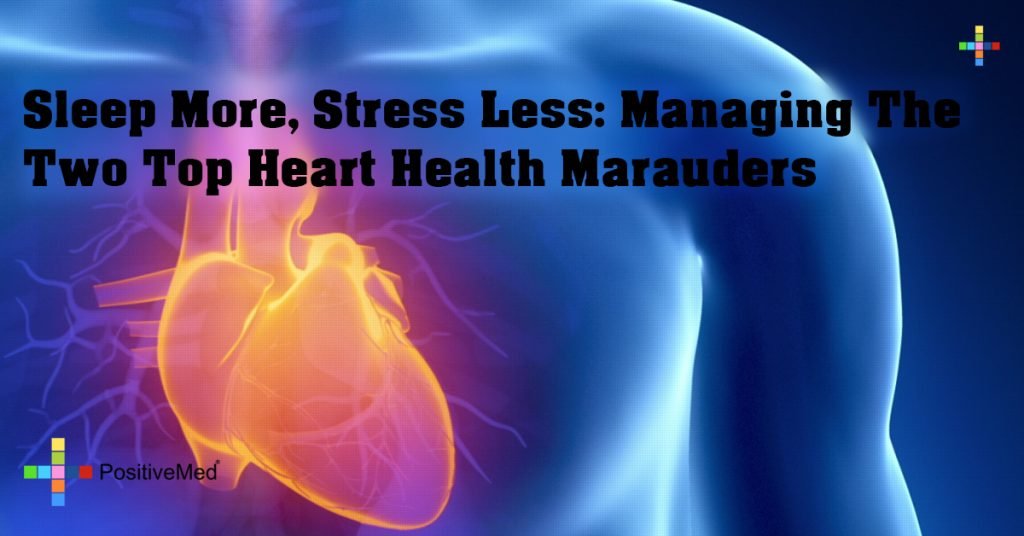
Sleep More, Stress Less: Managing the Two Top Heart Health Marauders
Think of the heart as your body’s engine. Your car won’t run and is considered useless if something goes wrong with the engine. You can always get a new car but you don’t get a second chance at life. Therefore, it’s important to do all you can to maintain the heart health as well as avoid things that can damage or place unneeded stress on it. Adequate sleep and less stress are two ways to keep your heart running.

The Benefit of Sleep
It’s inevitable; if you stay awake long enough, the body is going to grow exhausted and want to shut down. It happens naturally, but not all people understand how adequate sleep is vital to keeping a heart healthy. Sleep deprivation and sleep apnea are damaging and sometimes lethal since the ailments have been linked to heart disease.
Losing a few winks here and there is okay, yet consistent lack of sleep leads to many health issues including high cholesterol, heart disease, and higher blood pressure. Many people have a lot of things they would like to do in addition to mandatory necessities such as going to work and caring for children. However, keeping a schedule and ensuring you get eight hours of sleep per night is incredibly important.
RELATED ARTICLE: Why You’ve Been Harming Your Body While You Sleep and How to Fix It
There is a high correlation between sleep apnea and heart disease. Irregular snoring makes people with sleep apnea awake during the night and miss out on restful sleep. Tissue in the mouth or throat blocks one’s airway, which causes the body to react and a person to gasp for needed air. The process makes the heart beat faster as blood pressure rises. Other issues, like heart rhythm disorders, affect one’s health. Get the fact from abbottep.com.
The Need for Less Stress
The heart is influenced by one’s mental state. Stress can create all kinds of health issues including depression, anxiety, and anger. As a result, those mental states place physical stress on the body and heart. So in addition to getting more sleep, which helps curb feelings of anxiety and stress, be sure to stay mindful of your mental state.
It’s illogical to think that one can lead a life free of pressure and stress; many people feel pressure related to relationships, family, work, etc. However, while you can’t change what happens to you, you can alter how you internalize and react to what happens. Some people modify how they react to stressful situation by living in the moment; rather than reacting, people recognize a stressful situation and begin to formulate thoughts to keep calm while searching for a positive resolution. Others need help from a counselor. Regardless of how one avoids stress, the result is the same – less pressure on the heart and a healthier lifestyle.
In addition to counseling, seek solace in regular exercise, a pet, spending time with friends, engaging in a hobby, meditation, etc. People vary; some need to exercise each day to avoid stress while others need several hours on a weekend to themselves to maintain focus and avoid stress throughout the week.
The Extra Health-Related Habits
In addition to getting rest and avoiding stress, particular habits are directly and indirectly related to heart health. For example, smoking or chewing tobacco is bad for the heart health (as well as other parts of the body). If you can’t quit, seek help, and in the meantime, consider decreasing use. Secondly, a lack of exercise leaves a body susceptible to health issues. Regular exercise is a way to protect the body and heart from chronic conditions. Aspire to 30 minutes of exercise per day.
Thirdly, maintaining a healthy weight is important. Aside from the cosmetic benefit, staying in shape helps avoid added strain on the heart and bones. A healthy weight also ensures you have low blood pressure. Moreover, pay better attention to your diet. A balanced diet that includes vegetables and fruit helps maintain weight and keeps a heart health at proper level. Stay away from saturated fats and fast foods. Try to limit sugary foods, desserts, and fatty foods to once per week if you can’t avoid them altogether.
Lastly, limit the amount of alcohol you consume. Some like to have a drink after work or enjoy a glass of wine for dinner. While occasional drinks are not a threat to your health, pay attention to your level of tolerance. Very few people drink for the ‘taste.’ More people drink for the subsequent feelings of elation. However, the more often you drink, the higher amount of alcohol is needed to reach that feeling of well being.
Sienna Barnes is a medical student who has plans to become a heart surgeon – A long road of study lies ahead for her. When not rushed off of her feet she unwinds by writing articles whilst drinking endless cups of coffee!
Disclosure Policy:
This blog is a collaborative blog written by a group of individuals. This blog accepts forms of cash advertising, sponsorship, paid insertions or other forms of compensation. The compensation received may influence the advertising content, topics or posts made in this blog. That content, advertising space or post may not always be identified as paid or sponsored content. The owner(s) of this blog is compensated to provide opinion on products, services, websites and various other topics. Even though the owner(s) of this blog receives compensation for our posts or advertisements, we always give our honest opinions, findings, beliefs, or experiences on those topics or products. The views and opinions expressed on this blog are purely the bloggers’ own. Any product claim, statistic, quote or other representation about a product or service should be verified with the manufacturer, provider or party in question. This blog does contain content which might present a conflict of interest. This content will always be identified.






